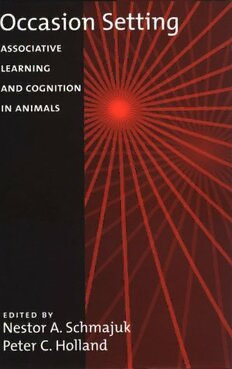
Occasion Setting: Associative Learning and Cognition in Animals (Apa Science Volumes) PDF
407 Pages·1998·28.221 MB·English
Most books are stored in the elastic cloud where traffic is expensive. For this reason, we have a limit on daily download.
Preview Occasion Setting: Associative Learning and Cognition in Animals (Apa Science Volumes)
Description:
Over sixty years ago, B. F. Skinner proposed that a discriminative stimulus in an operant conditioning paradigm does not elicit a response but simply "sets the occasion" for the response to occur. More recently, investigators have claimed that, whereas in many Pavlovian conditioning paradigms a conditioned stimulus (CS) elicits a conditioned response (CR) because it signals the occurrence of an unconditioned stimulus, in other paradigms a CS elicits a CR because it sets the occasion for the responding produced by another CS. The eminent group of experimental psychologists and theoreticians who authored the chapters of this book discuss the current status of data and theories concerning simple classical conditioning and occasion setting. Part 1 compares the properties of simple stimuli and occasion setters; Part 2 analyzes the different paradigms in which the concept of occasion setting can be applied; and Part 3 introduces four formal models of classical conditioning that address occasion setting.
See more
The list of books you might like
Most books are stored in the elastic cloud where traffic is expensive. For this reason, we have a limit on daily download.
